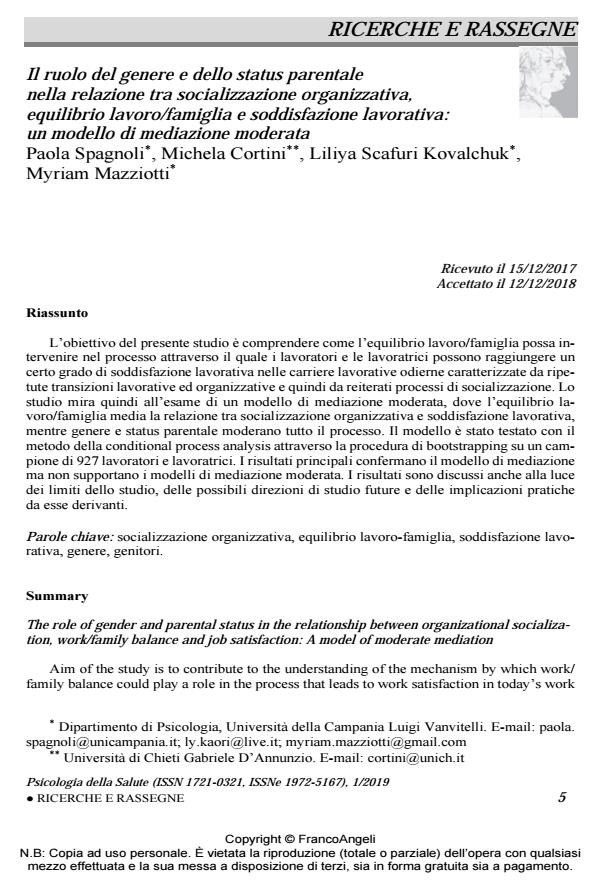The role of gender and parental status in the relationship between organizational socializa-tion, work/family balance and job satisfaction: A model of moderate mediation
Journal title PSICOLOGIA DELLA SALUTE
Author/s Paola Spagnoli, Michela Cortini, Liliya Scafuri Kovalchuk, Myriam Mazziotti
Publishing Year 2019 Issue 2019/1
Language Italian Pages 20 P. 5-24 File size 284 KB
DOI 10.3280/PDS2019-001001
DOI is like a bar code for intellectual property: to have more infomation
click here
Below, you can see the article first page
If you want to buy this article in PDF format, you can do it, following the instructions to buy download credits

FrancoAngeli is member of Publishers International Linking Association, Inc (PILA), a not-for-profit association which run the CrossRef service enabling links to and from online scholarly content.
Aim of the study is to contribute to the understanding of the mechanism by which work/ family balance could play a role in the process that leads to work satisfaction in today’s work activities characterized by repeated work and organizational transitions, and therefore by repeated socialization processes. Specifically, the study aims at examining a model of moderate mediation, where the effect of work/family balance mediates the relationship between organizational socialization and job satisfaction, and gender and parental status moderate the whole process. The model was tested using conditional process analysis through the bootstrapping procedure on a number of 927 workers. Evidence supported the mediation model but did not support the moderated mediation models. Results are discussed in light of the limits of the study, of the possible future directions of study and of the practical implica-tions deriving from them.
Keywords: Organizational socialization, work-family balance, job satisfaction, gender, parents.
- I’ll Be a Caregiver-Employee: Aging of the Workforce and Family-to-Work Conflicts Daniela Converso, Ilaria Sottimano, Sara Viotti, Gloria Guidetti, in Frontiers in Psychology 246/2020
DOI: 10.3389/fpsyg.2020.00246
Paola Spagnoli, Michela Cortini, Liliya Scafuri Kovalchuk, Myriam Mazziotti, Il ruolo del genere e dello status parentale nella relazione tra socializzazione organizzativa, equilibrio lavoro/famiglia e soddisfazione lavorativa: un modello di mediazione moderata in "PSICOLOGIA DELLA SALUTE" 1/2019, pp 5-24, DOI: 10.3280/PDS2019-001001